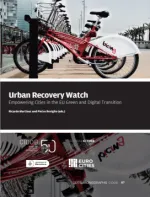Supported localism? – Cities facing the challenge of multiple transitions in the German Federal State

There has been a keen interest in how cities reacted to the several moments of crisis in recent European history. In a comparative study on state support schemes for cities in the face of the 2008-2009 financial crisis, Cucca and Ranci (2022, p. 13) call the German approach “supported localism”. This approach is characterised by supportive financial relationships between cities and upper-level governments and vertical coordination. At the same time, cities enjoy significant financial autonomy and leeway to implement policies. The research is limited as the only German case study is Munich – a prosperous city and capital of Bavaria that generates enough tax revenue to react in a situation of crisis. Other cities in Germany have much fewer resources and rely more heavily on state support.
It is true, however, that all German cities, while they are guaranteed self governance in the German constitution, form part of a comprehensive and complex multi-level governance system. This includes a variety of channels of public financial support; some are temporary and ad hoc; others have existed for decades. The COVID-19 pandemic and the related adverse effects on German cities and towns stress-tested this system of “supported localism”. Whether cities are viewed as a co-producer or passive beneficiary of assistance programmes depends very much on the programme under scrutiny. The German Recovery and Resilience Plan (GRRP), for instance, has no explicit urban dimension and, to the irritation of local government leaders, cities and local government networks were not involved in the design of the plan (Zimmermann, 2022; Zimmermann and Linse, 2021).
The sum available for Germany initially was about €23.6bn, much less than the amounts other European states received and about one-fifth of the country’s own stimulus programme from June 2020.1 Nevertheless, cities will benefit from measures in several areas such as modernisation and digitalisation of public administration and climate-friendly mobility.